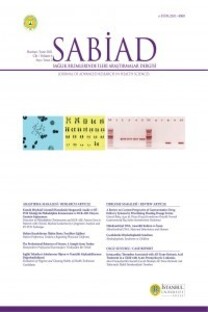MEZENKİMAL KÖK HÜCRELERİN FARKLI ÇÖZELTİ VE SICAKLIKLARDA SAKLANMASI
Mezenkimal Kök hücre, Flow Sitometri, Canlılık
STORAGE OF MESENCHYMAL STEM CELLS IN DIFFERENT SOLUTIONS AND TEMPERATURES
Mesenchymal Stem Cell, Flow Cytometry, Vitality,
___
- 1. Shen T, Xia L, Dong W, Wang J, Su F, Niu S, Fang Y. A systematic review and meta-analysis: safety and efficacy of mesenchymal stem cells therapy for heart failure. Curr Stem Cell Res Ther 2021; 16(3):354-65.
- 2. Lavorato A, Raimondo S, Boido M, Muratori L, Durante G, Cofano F, Garbossa D. Mesenchymal stem cell treatment perspectives in peripheral nerve regeneration: systematic review. Int J Mol Sci 2021; 22(2):572.
- 3. Gentile P, Garcovich S. Systematic review: adipose-derived mesenchymal stem cells, platelet-rich plasma and biomaterials as new regenerative strategies in chronic skin wounds and soft tissue defects. Int J Mol Sci 2021; 22(4):1538.
- 4. Wang LT, Liu KJ, Sytwu HK, Yen ML, Yen BL. Advances in mesenchymal stem cell therapy for immune and inflammatory diseases: Use of cell‐free products and human pluripotent stem cell‐derived mesenchymal stem cells. Stem Cells Transl Med 2021; 10(9):1288-1303.
- 5. Wang YH, Tao YC, Wu DB, Wang ML, Tang H, Chen EQ. Cell heterogeneity, rather than the cell storage solution, affects the behavior of mesenchymal stem cells in vitro and in vivo. Stem Cell Res Ther 2021; 12(1):1-11.
- 6. Çiçek G, Duman S, Aktan TMJE. Mesenchymal Stem Cell Signaling Pathway and Interaction Factors. Experimed 2020; 9(3): 120-9.
- 7. Jung Y, Bauer G, Nolta JA. Concise review: induced pluripotent stem cell‐derived mesenchymal stem cells: progress toward safe clinical products. Stem Cells 2012; 30(1):42-7.
- 8. Çiçek G, Ozen EU, Bagcı FO, Duman S, Aktan TM, Gundeslioglu AO, et al. Examination of Adipose Tissue-derived Mesenchymal Stem Cell Surface Markers in a Hypoxic Environment. Cell Tissue Biology Journal 2020; 14(5):325-31.
- 9. Ścieżyńska A, Soszyńska M, Szpak P, Krześniak N, Malejczyk J, Kalaszczyńska I. Influence of Hypothermic Storage Fluids on Mesenchymal Stem Cell Stability: A Comprehensive Review and Personal Experience. Cells 2021; 10(5):1043.
- 10. Hoang VT, Trinh QM, Phuong DTM, Bui HTH, Ngan NTH, Anh NTT, Hoang DM. Standardized xeno-and serum-free culture platform enables large-scale expansion of high-quality mesenchymal stem/ stromal cells from perinatal and adult tissue sources. Cytotherapy 2021; 23(1):88-99.
- 11. Cui LL, Kinnunen T, Boltze J, Nystedt, J, Jolkkonen J. Clumping and viability of bone marrow derived mesenchymal stromal cells under different preparation procedures: a flow cytometry-based in vitro study. Stem Cells Int 2016; 1764938. doi.org/10.1155/2016/1764938.
- 12. Chen Y, Yu B, Xue G, Zhao J, Li R-K, Liu Z et al. Effects of storage solutions on the viability of human umbilical cord mesenchymal stem cells for transplantation. Cell Transplant 2013; 22(6):1075-86.
- 13. Gálvez-Martín P, Hmadcha A, Soria B, Calpena-Campmany AC, Clares-Naveros B. Study of the stability of packaging and storage conditions of human mesenchymal stem cell for intra-arterial clinical application in patient with critical limb ischemia. Eur J Pharm Biopharm 2014; 86(3):459-68.
- 14. Muraki K, Hirose M, Kotobuki N, Kato Y, Machida H, Takakura Y, et al. Technical report: Assessment of viability and osteogenic ability of human mesenchymal stem cells after being stored in suspension for clinical transplantation. Tissue Eng 2006; 12(6):1711-9.
- Yayın Aralığı: Yılda 3 Sayı
- Başlangıç: 2018
- Yayıncı: İstanbul Üniversitesi
COVID-19 VIRÜS ILE ENFEKTE OLAN BIR HASTANIN HEMŞIRELIK BAKIMI: OLGU SUNUMU
UVEAL MALIGN MELANOMA HASTALARININ SERUM/ PLAZMASINDA YÜKSEK miR-454 EKSPRESYONU
Masoumeh HASSANİ, Demet AKDENİZ, Tunay DOĞAN, Samuray TUNCER, Hülya YAZICI
ÖZEL BOYUTLU AORT KAPAK: AORT KÖKÜ MORFOLOJİSİNİN GEOMETRİK MODELLEMESİ KULLANARAK ÜÇ BOYUTLU BASKI
KORONAVIRÜS HASTALIĞINDA MINERAL TAKVIYELERI
Nurgül VEYİSOĞLU, Beyza MENDEŞ
YENİ KORONAVİRÜS (COVİD-19) SALGINIYLA MÜCADELEDE MOLEKÜLER BİYOLOJİ VE GENETİK ÇALIŞMALARI
Pervin Elvan TOKGÜN, Sude DEDEOĞLU, Ayşe Gaye TOMATIR
Sevinç BABA, Zerrin AKTAŞ, Mustafa Oral ÖNCÜL
COVID-19 PANDEMİSİNİN DİŞ HEKİMLİĞİ HİZMETLERİNE ETKİLERİ VE ETİK
Gülsüm AK, Sabire DEGER İŞLER, Kadriye PEKER, Özen ONUR, Mustafa Mert AÇIKGÖZ
MEZENKİMAL KÖK HÜCRELERİN FARKLI ÇÖZELTİ VE SICAKLIKLARDA SAKLANMASI
Mehmet BERKER, Emine UTLU ÖZEN, Fatma ÖZ BAĞCI
COVID-19 PANDEMI DÖNEMINDE DIŞ HEKIMLIĞI EĞITIMINDE YENI NORMALLER
Özen ONUR, Sabire DEGER İŞLER, Gülsüm AK, Kadriye PEKER, Mustafa Mert AÇIKGÖZ
